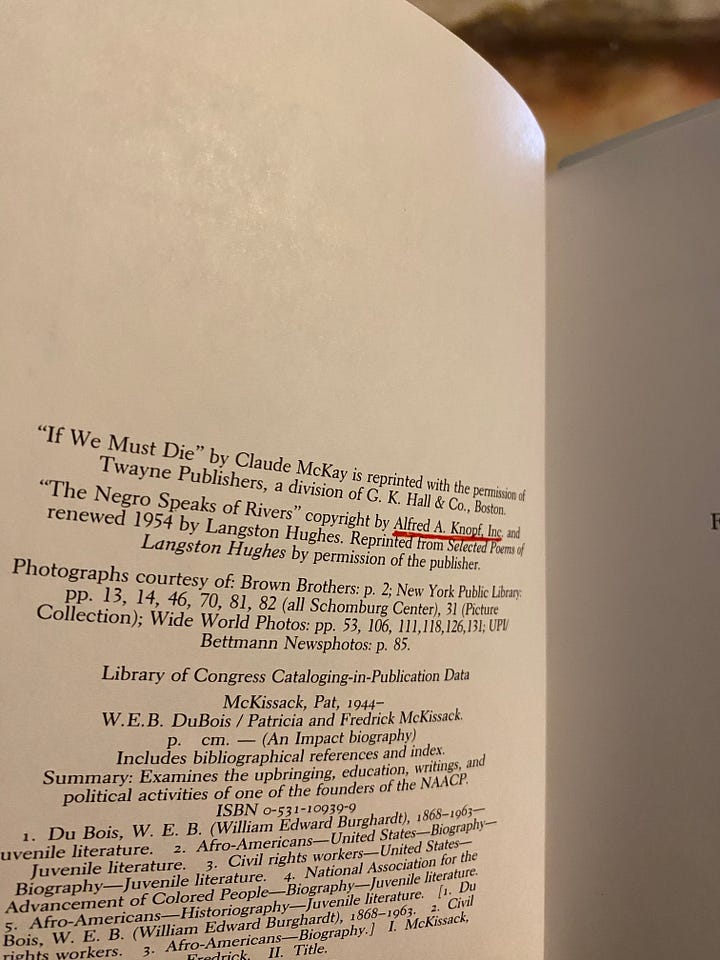Alfred A. Knopf Publishers, established in 1915 by Alfred A. Knopf Sr, is an American publisher that has made significant contributions to Black history literature. The company was launched with a vision to publish "distinguished, distinctive, and different" books,
The early years of the company were marked by a commitment to high-quality books, with a focus on European and American authors. Knopf's personal interest in literature and art significantly influenced the selection of works and the aesthetic of the books he had published.
As the 20th century progressed, Alfred Knopf expanded its repertoire. This expansion wasn't just in the genres and types of books published but also in embracing diverse voices, including those from the Black American community. The publishing house became known for its commitment to quality, not just in content but also in book design, a hallmark of Knopf publications.
One of the most significant aspects of Alfred Knopf Publishers is its extensive contribution to Black history and literature. This commitment began in an era when mainstream publishers often overlooked Black authors and their stories.
Knopf filled a crucial gap in American literature by providing a platform for these voices. This decision was not only a business strategy but also a reflection of a deeper understanding of the cultural and historical importance of these works.
The reasons behind Knopf's focus on Black history books are multifaceted. Firstly, it was a reflection of the changing social and cultural landscape of America. The mid-20th century was a time of significant social change, with the Civil Rights Movement and a growing awareness of racial issues. Publishing books on Black history and by Black authors was a way to contribute to this evolving dialogue.
Secondly, Alfred Knopf Publishers recognized the literary talent and potential in Black authors and their stories. These were narratives that offered fresh perspectives and enriched American literature. Authors like Langston Hughes, one of the central figures of the Harlem Renaissance, found a platform in Knopf that might have been denied by other publishers of the time.
The significance of Knopf's publishing of Black history books is immense. By giving a voice to Black authors and stories, Knopf helped in shaping a more inclusive understanding of American history and culture. These publications have been instrumental in educating generations about the experiences, struggles, and contributions of Black Americans. They have also played a role in challenging stereotypes and fostering a deeper understanding and respect for racial diversity.
Moreover, Knopf’s commitment to these books went beyond mere publishing; it was about creating a legacy and a repository of cultural and historical knowledge that would otherwise have been at risk of being forgotten or marginalized. This has had a lasting impact on American society, contributing to ongoing discussions about race, equality, and history.
Through its century-long journey, Alfred A. Knopf Publishers has not only served as a witness to American literary evolution but also an active participant in shaping it. Its role in publishing Black history books has been particularly noteworthy.
This decision, rooted in a vision that transcended mere commercial interests, reflects a deeper commitment to diversity, education, and cultural enrichment. The legacy of Alfred Knopf Publishers in this regard is a testament to the power of literature as a tool for understanding, empathy, and social change. It stands as a beacon for future publishers to continue exploring and amplifying diverse voices, thereby enriching the tapestry of American literature and history.


There are a number of books which highlight Knopf’s significant role in amplifying Black voices and history through literature. One landmark publication is "The Autobiography of Malcolm X," as told to Alex Haley. This seminal work, published in 1965, offers an unflinching look at the life of one of the most influential Black leaders of the 20th century. It remains a crucial resource for understanding the civil rights era and the complexities of racial relations in America.
Another important title is "Song of Solomon" by Toni Morrison, released in 1977. This novel, rich in its exploration of Black identity and heritage, won the National Book Critics Circle Award. Morrison's exquisite storytelling weaves a tale that delves deep into African American culture and history, earning her a place as one of the most important writers of her time.
"Beloved," also by Morrison and published in 1987, is another Knopf publication that left an indelible mark on American literature. This Pulitzer Prize-winning novel confronts the harrowing legacy of slavery, narrating a story of love and trauma with profound empathy and insight. It's a haunting, yet necessary, examination of the enduring impact of slavery on individual lives and American society as a whole.
Through these publications, Alfred A. Knopf has not only enriched the literary world but also significantly contributed to the discourse on Black history and experiences.
Today, Alfred A. Knopf Publishers operates as part of the Knopf Doubleday Publishing Group, which is a division of Penguin Random House, one of the largest English-language publishers in the world.
The imprint has maintained its reputation for high-quality publications and is known for its distinguished list of authors. Alfred Knopf Publishers has a legacy of publishing significant literary works, including fiction, non-fiction, and poetry. It continues to uphold its tradition of publishing a diverse range of voices and has remained a significant player in bringing important literary works to the public.
While the publishing industry has undergone significant changes over the years, with the rise of digital publishing and other evolving trends, Alfred A. Knopf Publishers has adapted to these changes while maintaining its core values of publishing excellence and editorial independence. The imprint's commitment to quality and its rich history in publishing significant literary works continue to define its presence in the modern publishing landscape.






It should be noted that Knopf was Jewish. As I recently noted in my review of “Blacks and Jews in America”, there was a natural alliance between Jews like Knopf and the Black American community. You fine article further establishes the existence and importance of this alliance.
When I was in the book publishing world, Knopf was revered. Thank you!